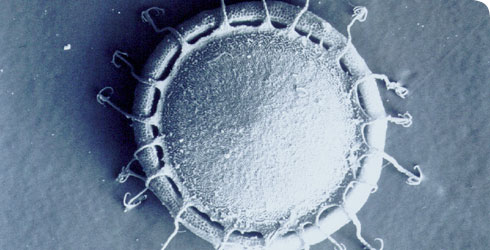Taxonomy
Morphology
Cristatella mucedo forms gelatinous, colourless, elongate colonies without branches or lobes that resemble a caterpillar.
They form easily recognisable circular statoblasts with long, wiry, hooked spines.
Evolution
Morphological criteria suggest Cristatella mucedo and other gelatinous freshwater bryozoan species are derived within the Class Phylactolaemata.
However, molecular phylogenetic analyses suggest that morphological characters have converged within this class, and this suggests a more complicated evolutionary scenario (Okuyama et al. 2006; Fuchs et al. 2009).
Genetics
The genus contains a single species. However, two genetically distinct North American lineages may represent cryptic species (Freeland 2000b).
Variation in genome sizes has been recorded in North America (Potter 1979) - C-values (haploid DNA content) of 0.5 - 0.85 picograms.
Karyotyping has identified 8 chromosome pairs (Potter 1979).
Look-alikes
Smaller colonies (< 10 zooids) that lack statoblasts are difficult to distinguish from Lophophodella carteri.
